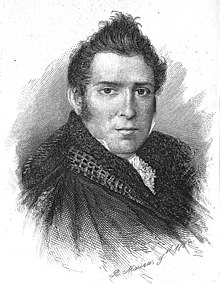You can help expand this article with text translated from the corresponding article in Spanish. (January 2020) Click for important translation instructions.
|
| Serafín Estébanez Calderón | |
|---|---|
 El Solitario El Solitario | |
| Deputy of the Cortes Generales for Coín | |
| In office January 8, 1847 (1847-01-08) – December 2, 1847 (1847-12-02) | |
| Deputy of the Cortes Generales for Ourense | |
| In office 1843 – October 31, 1846 (1846-10-31) | |
| Senator of the Cortes Generales (Senator for life) | |
| In office 1853 – 1867 | |
| Personal details | |
| Born | (1799-12-27)December 27, 1799 Málaga, Spain |
| Died | February 5, 1867(1867-02-05) (aged 67) Madrid, Spain |
| Occupation | Writer, politician, lawyer, historian & poet |
| Signature |  |
| Nickname | El Solitario |
Serafín Estébanez Calderón (27 December 1799 – 5 February 1867) was a Spanish writer, best known by the pseudonym of El Solitario. He was born in Málaga. His first literary effort was El listón verde, a poem signed "Safinio" and written to celebrate the revolution of 1820. He was called to the bar, and settled for some time in Madrid, where he published a volume of verses in 1831 under the assumed name of "El Solitario." He obtained an exaggerated reputation as an Arabic scholar, and played a minor part in the political movements of his time. He died in Madrid in 1867. His most interesting work, Escenas andaluzas (1847), is in an affected style, the vocabulary being partly archaic and partly provincial; but, despite its eccentric mannerisms, it is a vivid record of picturesque scenes and local customs. Estébanez Calderón is also the author of an unfinished history, De la conquista y pérdida de Portugal (1883), issued posthumously under the editorship of his nephew, Antonio Cánovas del Castillo.
References
- "ESTEBANEZ CALDERON , SERAFIN 16. Elecciones 6.12.1846". Congreso de los Diputados. Retrieved 16 August 2024.
- "ESTEBANEZ CALDERON , SERAFIN 14. Elecciones 15.9.1843". Congreso de los Diputados. Retrieved 16 August 2024.
- "ESTEBANEZ CALDERON , SERAFIN 15. Elecciones 3.9.1844". Congreso de los Diputados. Retrieved 16 August 2024.
- "ESTÉBANEZ CALDERÓN, SERAFÍN" (in Spanish). Senado de España. Retrieved 16 August 2024.
![]() This article incorporates text from a publication now in the public domain: Chisholm, Hugh, ed. (1911). "Estébanez Calderón, Serafín". Encyclopædia Britannica. Vol. 9 (11th ed.). Cambridge University Press. p. 794.
This article incorporates text from a publication now in the public domain: Chisholm, Hugh, ed. (1911). "Estébanez Calderón, Serafín". Encyclopædia Britannica. Vol. 9 (11th ed.). Cambridge University Press. p. 794.
External links
- Works by Serafín Estébanez Calderón at Project Gutenberg
- Works by or about Serafín Estébanez Calderón at the Internet Archive
- Works by or about El Solitario at the Internet Archive
- Works by Serafín Estébanez Calderón at LibriVox (public domain audiobooks)

- Serafín Estébanez Calderón, Wikisource en español
- Poesías de D. S. Estébanez Calderón: (El Solitario), hathitrust.org